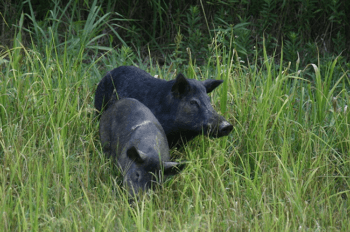Royal Pig In A Blanket? Study Shows Hawaiian Hogs Have Rich History

Hawaiians have always regarded pigs as something special, a notion that comes from their Polynesian roots centuries ago. In recent years, the islands have become overrun with thousands of feral hogs, and tradition or not, many islanders believe something has to be done to control the destructive beasts. However, a team of international scientists that includes a Texas A&M University professor has found that today’s wild feral hogs are descendants of the original pigs Polynesians brought to the islands, meaning they are a direct link to Hawaii’s rich cultural history.
Anna Linderholm, assistant professor of anthropology who also directs the BIG laboratory (bioarchaeology and genomics) at Texas A&M, and her colleagues have had their work published in the Royal Society Open Science. The other researchers are from the University of Copenhagen, the Smithsonian Conservation Biology Institute, the University of Hawaii, Trinity Western University of British Columbia, Uppsala University of Sweden, the University of Liverpool, the National University of Ireland and Cornell University.
The team examined 57 feral hogs and after analyzing DNA material and genetic markers and other methods, found that the hogs are almost certainly direct descendants of pigs brought to the islands hundreds – perhaps has many as 800 years – ago by Polynesians who eventually inhabited Hawaii.
“It has always been believed that the pigs were likely brought by famed explorer James Cook when he discovered the islands around 1778,” Linderholm explains.
“He almost certainly brought pigs, chickens and other animals with him. But our findings show that the wild hogs there today were introduced much earlier than his arrival, by hundreds of years at least. They likely came from European or Asian descent.”
As for Cook, he ended up much like one of his roasted pigs: legend has it that following a skirmish with local islanders at the time, he was killed and eventually eaten.
There is no doubt that in recent years, feral hogs have become a huge problem for all of the Hawaiian Islands.
Tens of thousands of the wild pigs forage and destroy planted crops and native plants, and the pigs that can weigh as much as 400 pounds have become a nuisance to homeowners and ranchers, as they have in Texas, where there are at least 2.6 million feral hogs, by far the most of any state, and where they cause more than $50 million a year in damage.
But the hog problem may still give island residents a conundrum. Texans love their cattle, and Hawaiians love their pigs. Millions of visitors to the islands have attended luaus where a roasted pig in the ground is considered a must-see event, and even Hawaiian lore has it that pigs were associated with various Polynesian gods and they were treated with great reverence and respect.
“The ancestry of feral hogs in Hawaii today can be traced back to Polynesians, and their colorful island history and legends are embedded in the state’s culture and many traditions,” Linderholm says.
“The lineage of these wild hogs is part of the state’s rich past, so management of these wild hogs will take considerable thought and careful planning.”
Media contacts:
- Anna Linderholm.
- Keith Randall, Texas A&M Division of Marketing & Communications.





